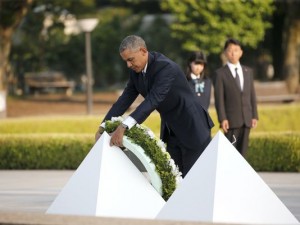Sympathy for victims, but no apology as Obama makes historic Hiroshima visit
< < Go Back
At Hiroshima Memorial, Obama Says Nuclear Arms Require ‘Moral Revolution’.
Nearly 71 years after an American bomber passed high above this Japanese city on a clear August morning for a mission that would alter history, President Obama on Friday called for an end to nuclear weapons in a solemn visit to Hiroshima to offer respects to the victims of the world’s first deployed atomic bomb.
Writing in the Hiroshima Peace Park guest book, Obama called for the courage to “spread peace and pursue a world without nuclear weapons.” In later remarks, he said that scientific strides must be matched by moral progress or mankind was doomed.
Obama’s visit, the first to Hiroshima by a sitting U.S. president, had stirred great anticipation here and across Japan among those who longed for an American leader to acknowledge the suffering of the estimated 140,000 killed during the bombing on Aug. 6, 1945, and its aftermath. That figure includes 20,000 Koreans who had been forced by the Japanese military to work in the city for the imperial war machine.
On Friday, people lined streets as Obama’s motorcade entered the city. The presidential limousine pulled up behind the Peace Memorial Museum.
National security adviser Susan E. Rice and Ambassador Caroline Kennedy walked out from near the museum, along with their Japanese counterparts, followed by Obama and Japanese Prime Minister Shinzo Abe.
Then Obama was handed a wreath and laid it on a stand in front of the cenotaph. He bowed his head and stood silently for a minute. Abe then did the same.
“We come to ponder a terrible force unleashed in a not-so-distant past,” Obama said. The souls of the people who died in this city “speak to us,” he added. “They ask us to look inward, to take stock of who we are and what we might become.”
The president called for nations to reconsider the development of nuclear weapons and to roll back and “ultimately eliminate” them.
After the remarks, Obama and Abe walked to the front row to greet Sunao Tsuboi, a survivor of the atomic blast, who stood up clutching a walking cane. Then Obama greeted Shigeaki Mori, another survivor, giving him a hug.
The president and prime minister then walked north toward the dome. Obama and Abe stood together gazing at the dome for several minutes. Abe appeared to be explaining the significance to Obama.
Previous U.S. presidents had avoided Hiroshima over fears that a visit would be regarded as an apology for President Harry Truman’s decision.
But Obama and his advisers believed the time was right, in his final year in office, to make the pilgrimage — not as an apology but rather to highlight the alliance between the two nations and to warn of the dangers of modern nuclear weapons exponentially more powerful than the bombs dropped in Japan.
Al Jazeera’s Harry Fawcett, reporting from Hiroshima, said Obama tried in his speech to strike the right balance in terms of the audience in Japan but also people listening to him back in the US.
“This is something that no president in the 71 years since the bomb was dropped here has felt able to do,” our correspondent said.
“So he tried to strike that balance by both talking about the specifics of what happened here, but also trying to put in the context not only of the Second World War, but also of human morality.”
More From The Washington Post:





